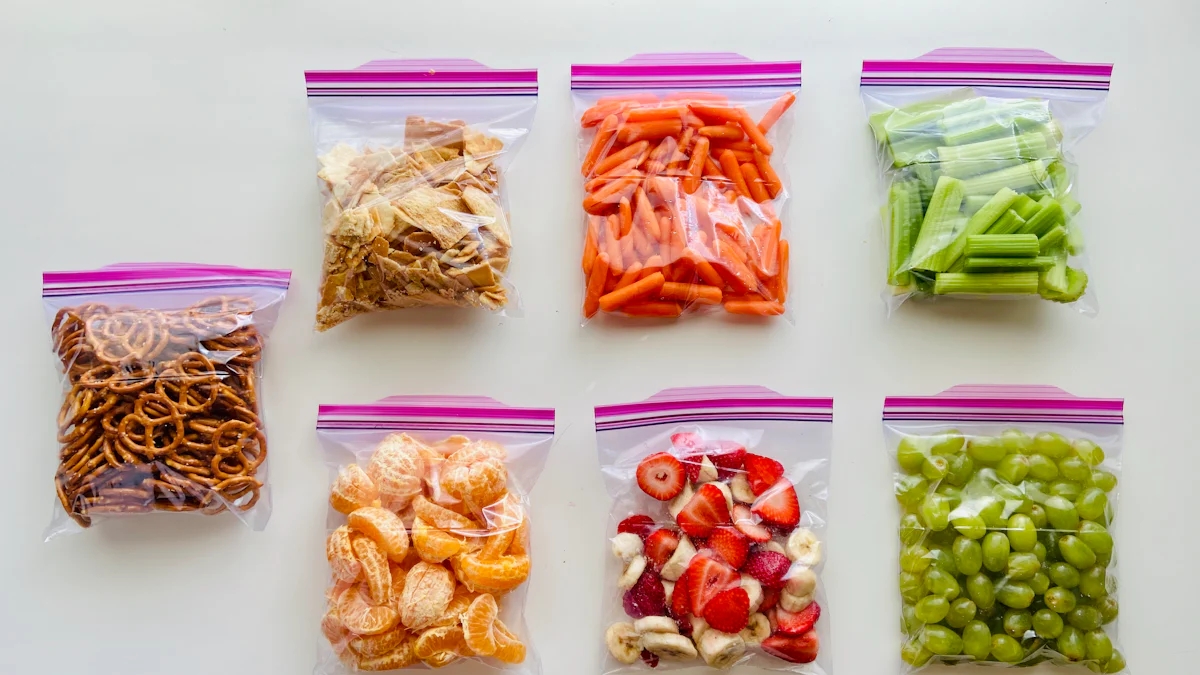
Winter calls for hearty meals and smart storage solutions. Choosing the right foods keeps your meals flavorful and your pantry stocked. Root vegetables, grains, and citrus fruits last longer and reduce waste. With food and kitchen tips from cooker king, you’ll enjoy delicious dishes while saving time and money this season.
Root Vegetables

Benefits of Root Vegetables in Winter
Root vegetables like carrots, potatoes, and parsnips are winter’s unsung heroes. They’re packed with nutrients like vitamin C, potassium, and fiber, which help keep your immune system strong during the colder months. These veggies are hearty and filling, making them perfect for comforting winter meals. Plus, they’re incredibly versatile. You can roast, mash, or even turn them into soups and stews. Another bonus? Root vegetables are budget-friendly and widely available, even when other fresh produce is harder to find.
Storage Tips for Root Vegetables
Storing root vegetables properly ensures they last for weeks, sometimes even months. Keep them in a cool, dark, and dry place, like a basement or pantry. Avoid storing them in plastic bags, as this can trap moisture and cause them to spoil faster. Instead, use breathable materials like paper bags or mesh sacks. For vegetables like carrots and beets, trim off the greens before storing. This prevents the greens from drawing moisture out of the roots. With these food and kitchen tips from cooker king, you’ll keep your veggies fresh and ready to use all winter long.
Cooking Ideas with Root Vegetables
Root vegetables shine in hearty winter dishes. Roast them with olive oil, salt, and your favorite herbs for a simple yet flavorful side dish. Add diced carrots and parsnips to stews for a sweet, earthy flavor. Mashed potatoes are a classic, but why not try mashing turnips or rutabagas for a twist? You can even spiralize sweet potatoes for a fun, healthy alternative to pasta. The possibilities are endless, so get creative in the kitchen!
Beans and LentilsWhy Beans and Lentils Are Winter Staples
Beans and lentils are the ultimate winter staples. They’re packed with protein, fiber, and essential nutrients like iron and magnesium. These tiny powerhouses keep you full and energized, which is exactly what you need during cold weather. Plus, they’re incredibly affordable and versatile. Whether you’re making soups, stews, or casseroles, beans and lentils add a hearty texture and rich flavor. They’re also plant-based, making them a great option if you’re looking to cut back on meat or try more vegetarian meals this winter.
How to Store Beans and Lentils for Long-Term Use
Storing beans and lentils is super easy. For dried beans and lentils, keep them in an airtight container in a cool, dry place. This prevents moisture and pests from ruining your stash. If you buy canned beans, store them in your pantry and check the expiration dates. Once opened, transfer any leftovers to a sealed container and refrigerate them. Following these food and kitchen tips from cooker king will help you keep your beans and lentils fresh for months, so you’ll always have them on hand for your favorite recipes.
Hearty Winter Recipes with Beans and Lentils
Beans and lentils are perfect for cozy winter dishes. Try making a classic lentil soup with carrots, celery, and a touch of garlic. Black beans work great in a smoky chili, while chickpeas can be roasted for a crunchy snack or tossed into salads. You can even use lentils as a base for a warm winter curry. The options are endless, so don’t be afraid to experiment and find your new favorite dish!
Winter SquashNutritional Benefits of Winter Squash
Winter squash is a powerhouse of nutrition. It’s loaded with vitamins A and C, which boost your immune system and keep your skin healthy during the colder months. It also contains fiber, helping you feel full and supporting digestion. The natural sweetness of squash comes with fewer calories, making it a guilt-free addition to your meals. Plus, it’s rich in antioxidants, which protect your body from harmful free radicals. Whether you choose butternut, acorn, or spaghetti squash, you’re adding a nutrient-packed ingredient to your winter diet.
Best Practices for Storing Winter Squash
Storing winter squash the right way ensures it stays fresh for weeks. Keep it in a cool, dry place with good air circulation. Avoid storing it in the fridge unless it’s already cut. Whole squash lasts longer at room temperature, while cut pieces should go into an airtight container in the fridge. Check your squash regularly for soft spots or mold. Following these food and kitchen tips from cooker king will help you make the most of your squash all season long.
Delicious Ways to Cook Winter Squash
Winter squash is incredibly versatile. Roast it with olive oil and spices for a caramelized side dish. Puree it into a creamy soup or mash it as a healthier alternative to potatoes. Spaghetti squash makes a great low-carb pasta substitute. You can even stuff acorn squash with grains, veggies, or meat for a hearty main course. Experiment with different recipes to find your favorite way to enjoy this winter staple.
PotatoesWhy Potatoes Are a Winter Essential
Potatoes are a winter classic for a reason. They’re hearty, filling, and incredibly versatile. Packed with potassium, vitamin C, and fiber, they give you the energy and nutrients you need to power through cold days. Potatoes also pair well with almost anything, making them a go-to ingredient for countless recipes. Whether you’re whipping up a creamy soup, a crispy side dish, or a comforting casserole, potatoes bring warmth and satisfaction to your table. Plus, they’re affordable and easy to find, even in the dead of winter.
Proper Storage Techniques for Potatoes
Storing potatoes the right way keeps them fresh and flavorful for weeks. Place them in a cool, dark, and well-ventilated spot, like a pantry or cellar. Avoid storing them in the fridge, as cold temperatures can turn their starches into sugar, affecting their taste and texture. Keep them away from onions, too, since onions release gases that can cause potatoes to spoil faster. Use breathable bags or baskets instead of plastic to allow proper airflow. Following these food and kitchen tips from cooker king will help you enjoy fresh potatoes all season long.
Comforting Potato Dishes for Cold Weather
Potatoes shine in winter recipes. Try a classic baked potato topped with sour cream and chives for a simple treat. Whip up a creamy potato soup with bacon and cheddar for a cozy meal. Mashed potatoes are always a hit, but you can also try scalloped potatoes for something extra indulgent. For a crispy option, roast potato wedges with olive oil, garlic, and rosemary. With so many options, you’ll never run out of ways to enjoy this winter essential.
Leafy Greens (Kale, Spinach, and Collards)Nutritional Value of Winter Leafy Greens
Leafy greens like kale, spinach, and collards are winter superfoods. They’re packed with vitamins A, C, and K, which help boost your immune system and keep your bones strong. These greens are also rich in antioxidants, protecting your body from harmful free radicals. Plus, they’re loaded with fiber, which supports digestion and keeps you feeling full longer. Kale is especially high in calcium, making it a great choice if you’re looking to strengthen your bones. Spinach and collards are excellent sources of iron, giving you the energy you need to tackle cold winter days.
How to Store Leafy Greens to Keep Them Fresh
Storing leafy greens properly can make all the difference. First, wash and dry them thoroughly. Excess moisture can cause them to wilt faster. Wrap the greens in a paper towel to absorb any remaining water, then place them in a breathable bag or container. Store them in the crisper drawer of your fridge, where the temperature is just right. If you notice any leaves starting to wilt, remove them to keep the rest fresh. Following these food and kitchen tips from cooker king will help you enjoy crisp, vibrant greens all winter long.
Cooking Ideas for Leafy Greens in Winter
Leafy greens are incredibly versatile in the kitchen. Sauté kale with garlic and olive oil for a quick, flavorful side dish. Add spinach to soups or stews for an extra nutrient boost. Collards work wonderfully in hearty dishes like braised greens with smoked meat. You can even blend spinach or kale into smoothies for a healthy start to your day. Don’t forget to toss them into casseroles or pasta dishes for added texture and flavor. With so many options, you’ll never run out of ways to enjoy these winter greens.
Citrus Fruits

Health Benefits of Citrus Fruits in Winter
Citrus fruits like oranges, lemons, and grapefruits are winter’s natural immune boosters. They’re packed with vitamin C, which helps your body fight off colds and flu. These fruits also contain antioxidants that protect your cells from damage. Feeling sluggish? The natural sugars in citrus fruits give you a quick energy boost without the crash. Plus, they’re hydrating, which is especially important when the cold air dries out your skin. Eating citrus regularly can even improve your mood, thanks to their bright flavors and refreshing aroma. Who doesn’t need a little sunshine in winter?
Storing Citrus Fruits for Maximum Freshness
Want your citrus fruits to last longer? Store them the right way. Keep whole fruits in the fridge to extend their shelf life by up to three weeks. If you prefer room temperature, place them in a bowl away from direct sunlight. For cut citrus, wrap the pieces tightly in plastic or store them in an airtight container in the fridge. This keeps them juicy and prevents them from drying out. Following food and kitchen tips from cooker king will help you enjoy fresh, zesty citrus all season long.
Creative Ways to Use Citrus Fruits in Winter Recipes
Citrus fruits aren’t just for snacking. Add orange slices to your salads for a burst of flavor. Use lemon juice to brighten up soups or marinades. Grapefruit pairs wonderfully with yogurt and honey for a quick breakfast. You can even zest the peels to enhance baked goods like muffins or cookies. For a cozy drink, try a warm lemon and honey tea. With so many options, citrus fruits can easily become the star of your winter kitchen.
Nuts and SeedsWhy Nuts and Seeds Are Perfect for Winter
Nuts and seeds are tiny but mighty when it comes to winter nutrition. They’re packed with healthy fats, protein, and essential nutrients like vitamin E, magnesium, and zinc. These nutrients help keep your energy levels up and support your immune system during the colder months. Plus, they’re incredibly satisfying, making them a great snack to curb hunger between meals. Whether you’re munching on almonds, walnuts, sunflower seeds, or chia seeds, these little powerhouses are perfect for staying fueled and warm all winter long.
Storage Tips for Nuts and Seeds
Proper storage is key to keeping nuts and seeds fresh and flavorful. Store them in airtight containers to protect them from moisture and air. For longer shelf life, keep them in the fridge or freezer. This prevents the natural oils in nuts and seeds from going rancid. If you buy them in bulk, divide them into smaller portions to avoid exposing the entire batch to air every time you open the container. Following food and kitchen tips from cooker king will help you enjoy fresh, crunchy nuts and seeds throughout the season.
Adding Nuts and Seeds to Winter Meals
Nuts and seeds are incredibly versatile in the kitchen. Sprinkle chopped walnuts or pecans over oatmeal for a hearty breakfast. Add sunflower seeds to your salads for extra crunch. Blend cashews into soups for a creamy texture without dairy. You can even use ground flaxseeds or chia seeds as egg substitutes in baking. For a sweet treat, try roasting almonds with a touch of honey and cinnamon. With so many options, it’s easy to incorporate these nutrient-packed ingredients into your winter meals.
Whole GrainsThe Role of Whole Grains in Winter Diets
Whole grains are a winter diet essential. They’re hearty, filling, and packed with nutrients like fiber, B vitamins, and minerals. These nutrients help keep your energy levels steady and your digestion on track during the colder months. Whole grains like oats, quinoa, and brown rice are also incredibly versatile. You can use them in everything from breakfast bowls to dinner casseroles. Plus, they’re budget-friendly and easy to find, making them a smart choice for winter meal planning. When the weather gets chilly, whole grains provide the warmth and comfort you crave.
How to Store Whole Grains for Long-Term Use
Storing whole grains properly ensures they stay fresh and ready to use. Keep them in airtight containers to protect them from moisture and pests. Glass jars or food-safe plastic containers work well. Store them in a cool, dry place, like a pantry or cupboard. For even longer storage, you can freeze whole grains. Just make sure they’re in a sealed bag or container to prevent freezer burn. Following food and kitchen tips from cooker king will help you keep your grains fresh for months, so you’ll always have them on hand.
Winter Recipes Featuring Whole Grains
Whole grains shine in winter recipes. Start your day with a warm bowl of oatmeal topped with nuts and dried fruit. For lunch, try a quinoa salad with roasted vegetables and a tangy dressing. Brown rice pairs perfectly with hearty stews or curries for dinner. You can even bake whole-grain bread or muffins for a cozy treat. Experiment with different grains and recipes to find your favorites. Whole grains make it easy to create satisfying, nutritious meals all winter long.
Fermented Foods (Sauerkraut, Kimchi, and Yogurt)Benefits of Fermented Foods for Winter Health
Fermented foods like sauerkraut, kimchi, and yogurt are winter health champions. They’re loaded with probiotics, which support your gut health and strengthen your immune system. A healthy gut means better digestion and improved nutrient absorption—both essential during the colder months. These foods also contain vitamins like B12 and K2, which help keep your energy levels steady and your bones strong. Plus, their tangy flavors can brighten up even the simplest winter meals. Adding fermented foods to your diet is an easy way to stay healthy and energized all season long.
Storing Fermented Foods Safely
Proper storage keeps fermented foods fresh and flavorful. For sauerkraut and kimchi, store them in airtight jars in the fridge. This slows down the fermentation process and preserves their taste. Yogurt should also stay refrigerated and sealed to maintain its creamy texture. Always use clean utensils when scooping out portions to avoid contamination. If you make your own fermented foods, ensure the containers are sterilized before use. Following food and kitchen tips from cooker king will help you store these probiotic-rich foods safely and enjoy them throughout winter.
Incorporating Fermented Foods into Winter Meals
Fermented foods are incredibly versatile. Add a spoonful of sauerkraut or kimchi to your soups or stews for a tangy kick. Use yogurt as a base for creamy dressings or marinades. You can even mix it into warm oatmeal for a unique twist. Pair kimchi with rice or noodles for a quick, flavorful side dish. Sauerkraut works wonderfully in sandwiches or as a topping for roasted vegetables. Experiment with these ideas to bring bold flavors and health benefits to your winter meals.
Fatty Fish (Salmon, Mackerel, and Sardines) Why Fatty Fish Are Ideal for Winter Nutrition
Fatty fish like salmon, mackerel, and sardines are winter nutrition powerhouses. They’re rich in omega-3 fatty acids, which support heart health and reduce inflammation. These fish also provide vitamin D, a nutrient many people lack during the darker months. Eating fatty fish can boost your mood and energy levels, helping you combat winter blues. Plus, they’re packed with protein, keeping you full and satisfied. Whether you’re grilling, baking, or pan-searing, fatty fish adds a delicious and nutritious touch to your winter meals.
Proper Storage of Fatty Fish
Storing fatty fish correctly ensures it stays fresh and safe to eat. If you buy fresh fish, keep it in the coldest part of your fridge and use it within two days. For longer storage, freeze it in an airtight container or vacuum-sealed bag. Label the package with the date to track freshness. Thaw frozen fish in the fridge overnight instead of on the counter. Following food and kitchen tips from cooker king will help you store fatty fish properly and enjoy its flavor all season long.
Cooking Ideas for Fatty Fish in Winter
Fatty fish is versatile and easy to cook. Try baking salmon with a honey-mustard glaze for a sweet and savory dish. Pan-sear mackerel with garlic and lemon for a quick, flavorful meal. Sardines work wonderfully in pasta or on toast with a squeeze of fresh lemon. You can even add smoked salmon to scrambled eggs for a hearty breakfast. Experiment with these ideas to bring warmth and nutrition to your winter table.
Winter cooking gets easier when you stock up on these 10 foods. From hearty root veggies to nutrient-packed fatty fish, each ingredient offers flavor and long-lasting storage. Proper storage saves money and reduces waste. So, plan your meals, get creative, and enjoy cozy, delicious dishes all season long.
Media Contact
Company Name: Zhejiang Cooker King Cooker Co., Ltd.
Email: Send Email
Phone: 86-579 87534901
Address:No. 599 Jiuding Road, Dongcheng Street
City: Yongkang City
State: Zhejiang Province
Country: China
Website: https://www.cookerking.cn/





